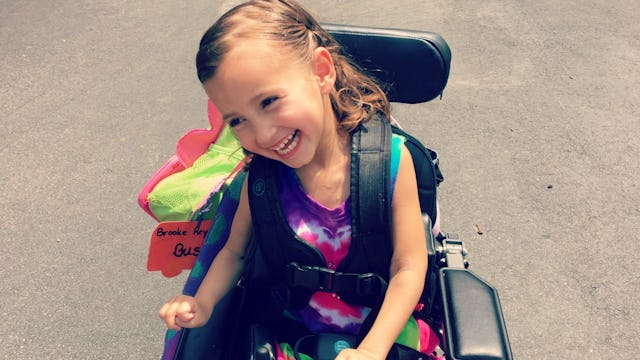My Amazing Daughter Has Cerebral Palsy, And This Is A Typical Day In Our Life

It’s 7:15 a.m. and soft crying can be heard on the baby monitor. Except there’s no baby here — it’s my 6-year-old daughter who is letting us know she’s awake and needs attention. She can’t get out of bed herself. She can’t even sit herself up. Cerebral palsy doesn’t even wait for a morning cup of coffee before it reminds you it’s part of your life.
My 8-year-old son Tyler gets up at 7:00 and greets me with hugs and kisses. He’s wise beyond his years and goes to greet his sister with his standard “Good morning, sunshine,” which turns those soft cries into giggles every day. This gives me time to throw in my contacts and then join them.
I carry Brookie from her bed to her changing table, change her diaper, and then carry her to the bathroom. She likes to sit on the counter to brush her teeth, so I hold her tightly with one arm so she can’t fall off and brush her teeth with the other.
My children love to dance, so Tyler holds her for a quick dance off, and then I carry her down the stairs.
Brookie uses a special seating system that provides lots of support so she can safely remain in a proper seated position for eating and playing. Breakfast — like every meal — takes over an hour to eat, but this is our bonding time. I am thankful Brookie can eat by mouth and drink from a straw. Many children with CP can’t, so I count my blessings at every meal. I take off the headrest, fix her hair, and we are ready to start the day.
Allison Reynolds
Over the summer, she attends a special needs camp for three hours and then does therapy. To go anywhere, I carry her down through the basement and put her in her car seat. I then load up both her manual wheelchair and power wheelchair and diaper bag. When Brookie gets home from camp, it’s off to therapy which is an hour away.
Heading to therapy is not a happy time because, like any other 6-year-old, she would rather play or go to the pool with her brother. While she does the hard, physical work, I get an emotional workout watching her try so hard. Supporting her own weight is hard. Holding her head up is hard. Reaching for objects is hard. But she never stops trying no matter how tired she gets.
Even though she’s nonverbal, we talk for hours. She talks with her eyes, her smile that never ends, and her gestures. She is sassy and smart but trapped inside her own body.
When we get home, she will eye gaze to go outside. She loves to be outside, so out we go. I carry her back down the stairs and strap her into her power chair. She likes to play hide-and-seek with her brother and his friends. Hearing her giggles and laughter always melts my heart into a million pieces. It’s like I forget for a split second that she has CP and all of the challenges that come with it.
This feeling is short-lived. Kids just being kids will make a new plan and head toward a house. Brookie rolls along behind them and then watches them all go in. She can’t follow because she’s in her power chair, and it can’t go up stairs. My heart that was just so full breaks into a million pieces as I watch the tears roll down her cheeks. Big brother comes to her rescue every time and gives up his playtime to stay outside with her. He makes me so proud. While I would love to believe his sweet demeanor and empathy is all because of my wonderful parenting, I know it’s because of the little sister he adores.
As the clock continues to tick, it’s time for stretches. She hates stretches. They are a necessary evil when your muscles are always tight. The whole family joins in to make it as fun as we can and help her forget the discomfort.
She loves Play-Doh and sensory bins to help open her hands and plays chef and helps me cook. After dinner, I move her to a stander, a piece of equipment that holds her in a vertical standing position. This helps strengthen her legs and hips, and being vertical is very important for so many bodily functions we take for granted. She loves to push a tennis ball off of the tray for our puppy to chase. Then it’s onto tickle time lying on the floor. What she thinks is a fun game is really our way to get her to roll or scooch along the floor. After dinner she watches her favorite YouTube videos, and we once again dance.
Daddy manages the nighttime routine of giving her medicine to help with muscle spasms and carrying her up the stairs to give her a bath using her special bath seat, brushing her teeth, changing her diaper and putting her to bed. We then spend the next few hours taking turns repositioning her so she’s comfortable and can sleep. She had double hip surgery and muscle lengthening in January and sleep has become an elusive memory.
We check on her closely on the monitor throughout the night, never getting into a deep sleep ourselves, to make sure she’s okay. Seizures are also always in the back of our minds. They say special needs parents have a higher rate of PTSD than soldiers. After a several-hour seizure in 2016, we believe it.
This is our routine day after day. Through it all, we always wake up and go to sleep dancing and make sure smiles wake her up and put her to bed.
Thank you for spending the day with us.
This article was originally published on